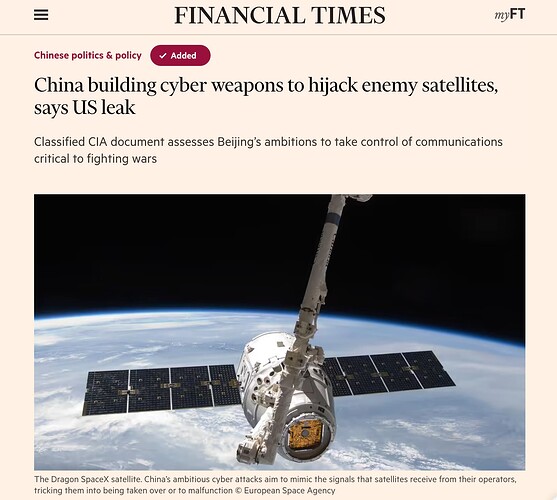-
中国正在建造复杂的网络武器,以 "夺取 "敌人卫星的控制权,目的是控制信息。
-
这比俄罗斯在乌克兰部署的更先进,后者是一种野蛮的方法,效果不大。
-
中国的网络攻击旨在模仿敌方卫星从运营商那里收到的信号,以接管它们或使它们发生故障。
-
台湾正在寻求建立能够在中国的攻击下生存的通信基础设施,并正在争取投资者建立自己的卫星供应商。
-
俄罗斯对乌克兰Viasat公司的网络攻击是 “灾难性的”,影响了其他国家的客户。
-
中国正在发展军事空间技术,包括卫星通信,以实现其 “太空梦”,即到2045年成为地球大气层以外最重要的国家。
-
美国太空部队的B Chance Saltzman将军说,中国正在积极追求反太空能力,以在网络和太空领域获得优势。
-
退役空军将军查理-摩尔说,中国正在做出巨大努力,以提高他们自己的能力,并利用美国在这两个领域的先发优势。
-
美国、中国和国家安全委员会拒绝就此事发表评论。
-
China is building sophisticated cyber weapons to “seize control” of enemy satellites, with the goal of controlling information.
-
This is more advanced than what Russia has deployed in Ukraine, which is a brute-force approach with little effect.
-
China’s cyber attacks aim to mimic signals that enemy satellites receive from operators, in order to take them over or make them malfunction.
-
Taiwan is seeking to build out communications infrastructure that can survive an attack from China, and is courting investors to establish its own satellite provider.
-
Russia’s cyber attack on Viasat in Ukraine was “catastrophic” and affected customers in other countries.
-
China is developing military space technology, including satellite communications, to realise its “space dream” of becoming the foremost power beyond the Earth’s atmosphere by 2045.
-
General B Chance Saltzman of the US Space Force said China was aggressively pursuing counter-space capabilities to gain an advantage in the cyber and space domains.
-
Retired Air Force General Charlie Moore said China was making huge efforts to improve their own capabilities and capitalise on the US’s first-mover advantage in both domains.
-
The US, Chinese, and National Security Council declined to comment on the matter.
